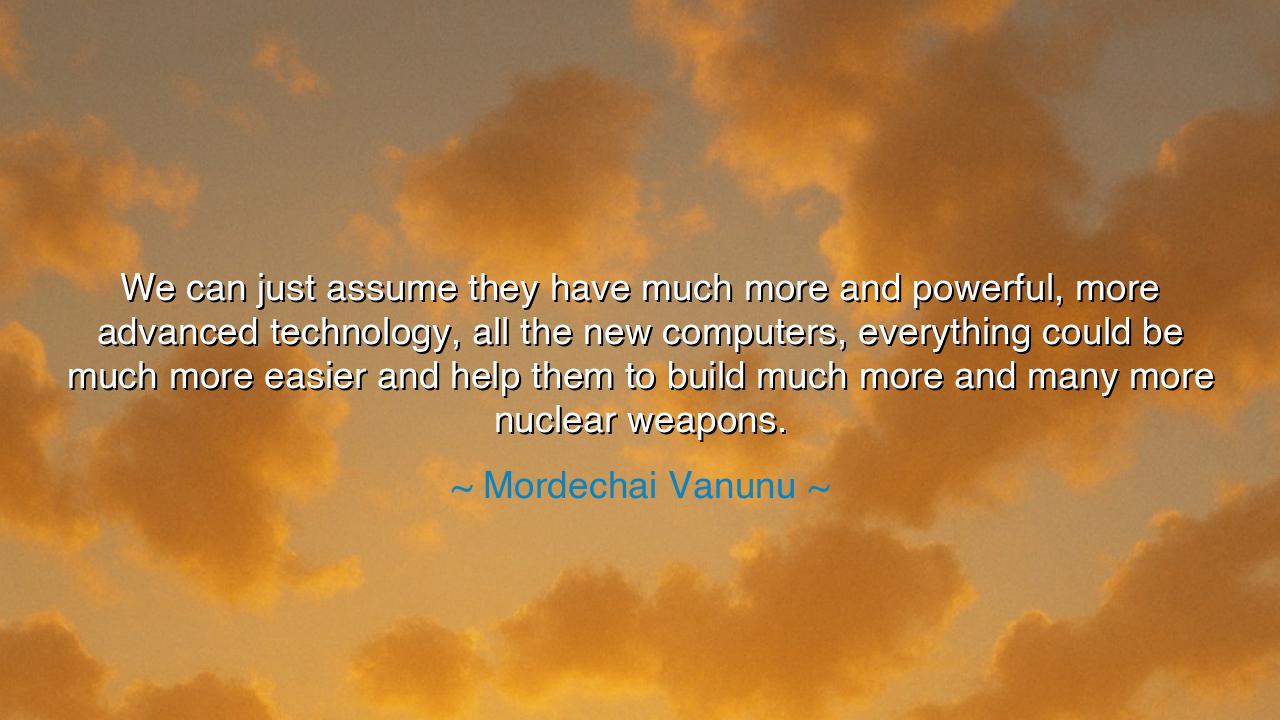
We can just assume they have much more and powerful, more
We can just assume they have much more and powerful, more advanced technology, all the new computers, everything could be much more easier and help them to build much more and many more nuclear weapons.






The words of Mordechai Vanunu, “We can just assume they have much more and powerful, more advanced technology, all the new computers, everything could be much more easier and help them to build much more and many more nuclear weapons,” resonate like a warning from the precipice of human ambition. He speaks not of abstract fears, but of the tangible reality that advanced technology, when coupled with intent, can amplify destructive capability to unprecedented scales. His insight reminds us that the pursuit of power without restraint is magnified by the tools at one’s disposal, transforming latent potential into immediate and perilous reality.
The origin of Vanunu’s reflection lies in his experiences as a whistleblower at Israel’s nuclear facility in Dimona during the 1980s. Witnessing the machinery and secrecy surrounding nuclear development, he understood that the combination of human will and technological advancement could produce weapons of mass destruction far more efficiently than the world imagined. His words capture the dual-edged nature of technology: it is a servant of human ingenuity, but when guided by secrecy or ambition, it becomes a force capable of reshaping global security in ways both profound and terrifying.
History offers stark parallels. During the Manhattan Project, scientists harnessed cutting-edge technology and newly developed theories to construct the first atomic bomb. The capacity to create such weapons existed not solely in intellect, but in the tools and systems of production and computation that amplified human knowledge. As Vanunu implies, the combination of advanced computers, machinery, and scientific insight accelerates capability, demonstrating that technology is a force multiplier that magnifies both creation and destruction.
Even more recently, the lessons of North Korea’s nuclear program reflect the same principle. With access to more advanced computing, improved modeling, and better international intelligence, the pace of weapon development has accelerated. The danger is compounded not merely by the ambitions of leaders, but by the availability of technological instruments capable of producing nuclear arms with greater speed, precision, and potency. Vanunu’s warning is thus universal: unchecked access to advanced technology magnifies the consequences of human desire for power.
The meaning of his words is profound: technology itself is neither benevolent nor malevolent; its character is shaped by the intentions of those who wield it. A tool that can illuminate and heal can also destroy. Nuclear weapons, computers, and advanced engineering are neutral forces until aligned with human ambition, and Vanunu’s insight urges caution, vigilance, and moral reflection. He reminds us that the ethics of technology are inseparable from the stakes of its application.
The lesson for future generations is urgent: monitor, regulate, and guide the development of technologies with destructive potential. Awareness of the capabilities available to those who seek dominance is essential for maintaining global stability. Knowledge without ethical foresight invites catastrophe, and the proliferation of advanced technology demands moral and societal frameworks to prevent misuse.
Practical action emerges clearly from this wisdom. Support transparency and verification measures in nuclear programs, advocate for international treaties limiting the spread of weapons of mass destruction, and educate future scientists and engineers on the moral responsibility inherent in technological innovation. Encourage the use of technology for advancement of human well-being rather than the amplification of destructive power.
Thus, let Mordechai Vanunu’s words endure as a solemn guide: advanced technology multiplies the potential for both creation and destruction. Humanity must wield it with vigilance, morality, and foresight. Only by recognizing the amplifying force of our tools can we ensure that ingenuity becomes a blessing for civilization rather than a herald of ruin.






AAdministratorAdministrator
Welcome, honored guests. Please leave a comment, we will respond soon